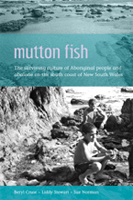Mutton Fish: The surviving culture of Aboriginal people and abalone on the south coast of NSW
Summary
The people of the south coast of NSW have a long and complex relationship with the coastal environment; one that has nurtured them for thousands of years. Mutton Fish includes lively interviews with Aboriginal people who have fished traditionally and taken part in the modern fishing industry. With clarity, it introduces some of the issues that arise when Indigenous cultural practice confronts white law.
'They used to gather mutton fish and trade with Chinese people...it would really be a family gather, where men would be diving, gathering mutton fish, bringing it to share and women and kids would be lighting the fires. So our people started trading way back then.
Mutton fish, or abalone, is a subsistence food — easy to find and harvest, extremely rich in energy and accessible for as long as the beaches are freely open to all. Mutton Fish, unique in its breadth and accessibility, seeks to tell of this relationship and what has happened to the south coast people as their access to the coastal resources has been progressively restricted by European competition.
The authors have created a thoroughly researched, readable history of Indigenous life on south coast NSW. Mutton Fish includes lively interviews with Aboriginal people who have fished traditionally and taken part in the modern fishing industry.
Reviews and endorsements
'To most non-Aboriginal Australians, the mutton fish is known as abalone, a prized seafood delicacy. This book, which started life as a TAFE project, is an attempt by two Aboriginal women and their TAFE teacher to record an oral history of Aboriginal abalone fishing on the NSW South Coast.'
— Bruce Elder, Sydney Morning Herald, 16–17 July 2005
